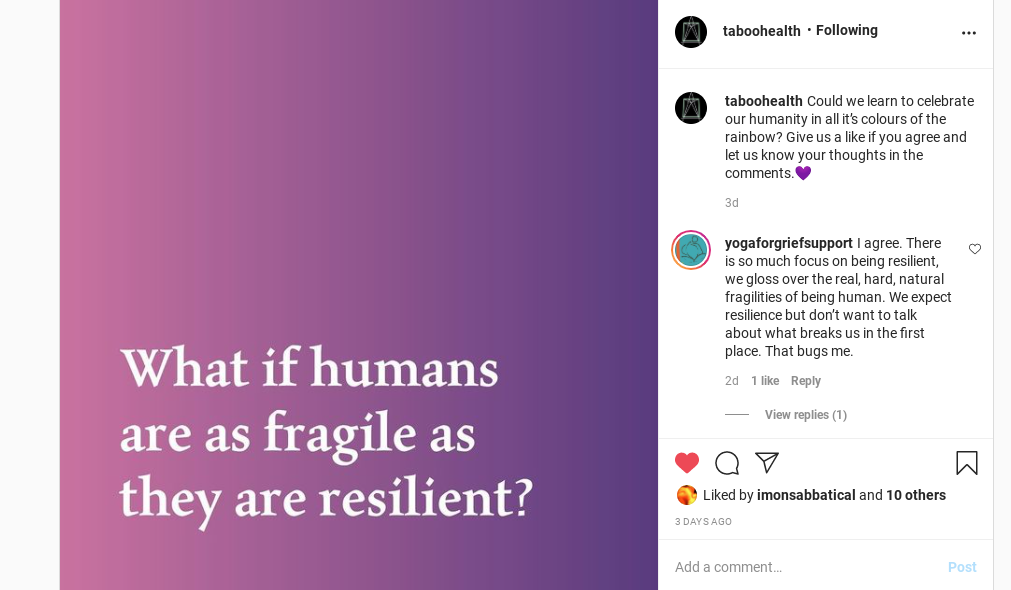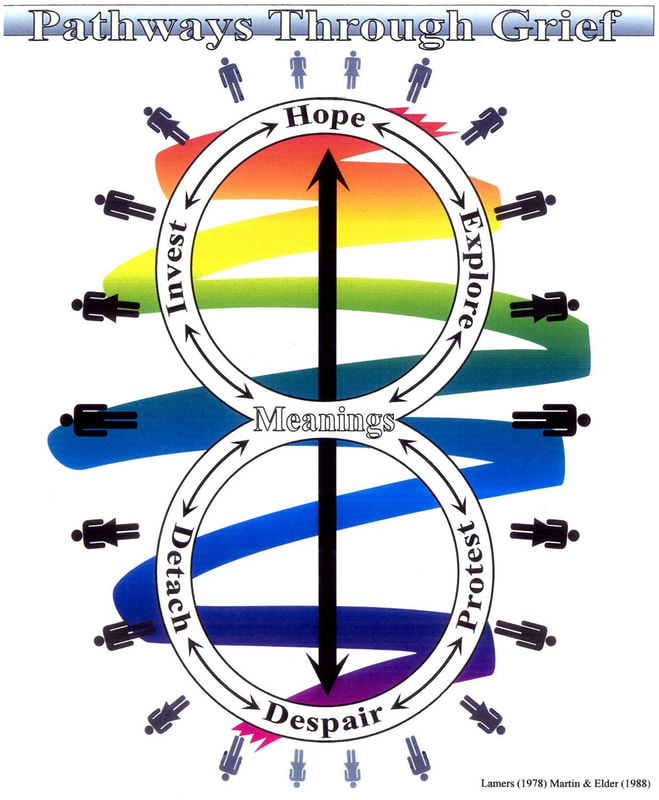|
IF I HEAR THE WORD RESILIENCE ONE MORE TIME...
We are 9 months into the pandemic and I’ve been working in a hospital the entire time. I’m tired. My cup is empty. I’m generally a pretty hopeful person, but even that is running on low. The R word is all over the healthcare world right now. It's the latest buzzword; considered a protective factor for any sort of stress, trauma, or difficult situation. It’s touted as the key to staying well, as the healthcare system crashes under the weight of Covid, and as our government cuts front-line healthcare staff. We “just” need to be more resilient (insert eye roll emoji here). Every Covid update meeting starts with tips from the wellness committee on how to be resilient. It’s frequently tied to two other R words: Rest and Recover, encouraging us to end our shift, go home, “rest and recover” so we can be ready to do it all again the next day. Recently, we got an email from the wellness committee encouraging moral resilience. “Notice and positively re-frame negative thoughts,” it suggested. “Learn to positively process difficult emotions,” it advised. I prickled at the word positively. By suggesting someone process their difficult experience in a "positive" way, the effect is pacifying, subduing and repressing, not actually integrating. When someone says something like this to me, I know that my emotion and vulnerabilities aren't welcome to be part of the conversation...and when I feel that, I feel un-cared for. And if you don't care about me as a whole person, with my negative thoughts and upset emotions, you don't get to tell me to be resilient. That email made me realize just how condescending and infuriating I find the R word to be. It feels like a re-branded "keep your chin up" message, which is so common in our emotion phobic culture. The word resilience stems from the Latin word "resilire," which meant to recoil or rebound. It is a term that is used to describe both objects and subjects. Objects/materials are described as having good resilience if they spring back into the shape they started in. In humans, it describes “the capacity to recover quickly from difficulties; toughness” (Oxford Dictionary). It is someone's ability to “bounce back” from difficult and challenging situations. It stings to look at the state of our world - with reality-tv-politics, genocides, colonialism, white supremacy, climate change, the rapid extinction of species, global pandemics, natural disasters, crashing economies and healthcare systems - and wonder what the hell we are actually planning on “bouncing back” to?! Surely THAT is not what they mean by resilience, is it? Resilient is what the general public should be - with ongoing lock-downs, cumulative losses, and heaps on uncertainty, we are told to be resilient: Learn resilience. Practice resilience. Perform resilience. Never-mind the fact that mental health and grief support were hugely underfunded BEFORE the Covid pandemic and we are headed straight into an “echo pandemic” of loss and grief. While economic recovery plans are being rolled out already, organizations promoting mental health support and grief support are still lobbying the government for increased funding, resources and support. Resilience is all over schools! Kids are expected to be resilient as the routine of school has been upended, and their social networks have completely been shut down. Students, with all sorts of individual learning needs are expected to be proficient at online learning, while educational assistants and support staff have been let go, and program funding for kids with developmental delays who need specialized support is being cut. Don't put resilience on them, especially if there is no infrastructure or support in place to actually meet their needs. Do we expect the healthcare system to magically bounce back just by thinking positively about it? No! It will bounce back by being a priority of the government and they will throw money at it. What about resilience and grief? I have had deep, personal and major losses that knocked my legs from beneath me, and punched me in the stomach. Oh how I wanted to bounce back to my old life. To erase the tragedy of loss and resume right where I left off. I woke up everyday for years wishing that I could somehow have my old life back. I can emphatically say: I didn’t “bounce back.” There was no bouncing in deep grief, unless you consider bouncing between emotional states that brought me to my knees over and over again. I didn’t spring or rebound to my previous state. I wouldn't even use the word "recover." I integrated the shit-storm of grief into me as a whole person, and continue to do that work, to this day. I completely changed as a person and had to learn how to live life anew, with a lack of resources, social support, and a general societal misunderstanding (or ignorance) about the human need to grieve. Don’t tell me to be resilient. Pushing resilience effectively glosses over the real, hard, natural fragility of being human. Taken from a New York Times article called The Profound Emptiness of Resilience consider this question "Why rise from the ashes without asking why you had to burn?"
This is the part that is missing. The acknowledgment of the burning times. True, deep, supportive, spacious, caring acknowledgement of the very things that are breaking our spirits, and breaking our hearts. We need space for THOSE first. Re-framing negative thoughts into positive ones isn’t enough. Those negative thoughts and difficult feelings have important things to say. We can’t just squelch them with positivity and hope for integration.
Yes, I want to learn how to adapt to change well. To weather life's storms with compassion and grace. I want to grow more whole as a person because of hardship and not break into a fraction of what I was. I want to have a sense of inner coherence, peace and meaning when I engage with my life.I want to respond with integrity to challenges, complex situations, distress and setbacks. I want to know my values, and be self assured in how I live them. Yes, I want all those things. But it's not about rising above my challenges to get there, it's about integrating them into who I am as a person. I don't think that "bouncing back" or resilience describes how that happens. There is a great model of grief support that I feel is a more appropriate image than bouncing back. It is called Pathways Through Grief and was developed by Karen Martin and Sandra Elder and was published as a chapter in a book called “Personal Care in an Impersonal World: A Multidimensional Look at Bereavement,” in 1993.
As you can see, the model is shaped like a figure-8. There is no starting point, or end point and no “steps or stages.” Rather it is open ended and flowy, suggesting a person would move around the 8 in a continuous way throughout their life.
The top half of the 8 describe more of an outward lived experience composed of things like exploring the world, investing yourself in relationships/things and hope. At other times you will be in the lower portion of the 8, on a more inward journey experiencing inner emotions such as protest,despair and detachment. The people standing outside the model represent your with your world including influences, support, and challenges. This model is unique for you as an individual. The middle part of the figure 8 says "meaning," which is the central concept of this model. Regardless of where you are in the figure-8 there is opportunity to use those experiences to define and make sense of your life, which then influences the path you take around the 8 and in your life. It’s important to highlight that both ends of the 8 (the “light” and the “dark”) intersect with meaning - the detaching and despairing life experiences have as much of an influence in how your life is shaped, as the hopeful and joyful experiences. This model speaks to the impermanence of life - we are always changing and experiencing different things. "Flowing through" feels more possible than "bouncing back." While, I'm sure the intention of the resilience movement is pure, I don't feel the word gives us enough space to acknowledge how much living life changes us. So, how can we frame the word resilience in a way that accounts for the impermanence, vulnerabilities and ALL the emotions we carry? Here are some points to consider:
“We think that the point is to pass the test or to overcome the problem, but the truth is that things don’t really get solved. They come together and they fall apart. Then they come together again and fall apart again. It’s just like that. The healing comes from letting there be room for all of this to happen: room for grief, for relief, for misery, for joy.”
0 Comments
|
AuthorSandy Ayre Categories
All
Archives
December 2022
|
Classes
|
Helpful Info
|
|



 RSS Feed
RSS Feed
